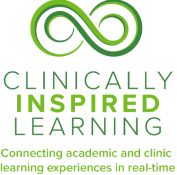
Life Chiropractic College West has adopted a revolutionary methodology in chiropractic learning. The Clinically Inspired Learning curriculum at Life Chiropractic College West balances classes in basic sciences, clinical sciences, technique and philosophy with extensive opportunities to gain hands-on experience in the Life West Health Center. In doing so, it molds students into confident, practice-ready chiropractors who enter the profession with well-rounded sets of skills.
Basic sciences are the nuts and bolts of the sciences. Students learn about different diseases, as well as pathology and terminology, and build foundations in anatomy and physiology.
Clinical science combines principles of chiropractic philosophy with knowledge from the basic sciences. Students learn to test, evaluate, investigate and adjust in a clinical setting.
Technique and analysis focus on a variety of chiropractic techniques that can be used in an adjustment. Students learn when and how to use these techniques in order to achieve optimal results in clinical settings.
The principles that Life West teaches are based on the teachings of D.D. Palmer, the founder of chiropractic. He believed that innate intelligence guides our wellness and allows our bodies to perform at optimal levels.
The Office of Academic Affairs is the area responsible for assisting students academically while in the Life West program. In addition, the Office of Academic Affairs reviews the Life West chiropractic program through continual assessment and evaluation that streamlines processes and assures successful transitions for students as they proceed through the curriculum.
The Office of Academic Affairs is overseen by the Vice President of Academic Affairs. The majority of the departments under the Office of Academic Affairs are located within the Academic Success Center. These departments include the Registrar’s Office, Academic Advising, Academic Support, Academic Counseling and Faculty Administrative Assistants. The Library, Financial Aid and the Office of Institutional Effectiveness and Planning fall under the Office of Academic Affairs as well.
Classes in the Technique Department represent the art of chiropractic. It is our mission to set the highest standards in chiropractic technique education to prepare our students for their future professional success in a nurturing environment. Life West students are able to progressively acquire new skills through the most comprehensive technique program of core and elective techniques of any chiropractic college.
Courses in the Clinical Sciences Department build upon Basic Science courses and serve to move our students from “textbook learner” to Health Center clinician. Assisting patients can be tricky, and every patient is different. Courses help students expand upon the basic knowledge of disease and dis-ease and focus on the patient as a whole person in conjunction with the philosophy of chiropractic.
The Basic Sciences Department serves to introduce our students to the building blocks of healthcare and the human body. Courses such as Biochemistry, Histology, Gross Anatomy, Neuroscience and Physiology develop an understanding of the human structure and function for our students, while courses such as Nutrition, Microbiology, Pathology and Toxicology build the foundation for our students to understand the repair, defense and development that can be experienced by the human system. The courses in this department provide the rich soil that allows our students to develop deep, strong roots which will give rise to a magnificent tree of clinical and philosophical knowledge.
The philosophy department houses the philosophy classes, business classes and research classes. The philosophy classes go into the development of the underlying foundation of what the chiropractic profession is all about. Philosophy classes often ask, “Why do we do what we do?,” and help advance the student’s understanding of where chiropractic lies in the greater healthcare landscape. These ideas are further developed in the business program to be applied in day-to-day clinical situations.
While philosophy classes provide the foundation for the student’s role in the profession, the business classes at Life West provide a foundation for the student’s role in an individual practice. The research classes tie them all together using an evidence-informed approach to success in clinical practice, which helps students understand the research community. Put together, the philosophy department gives the student essential tools for practical success after graduation.